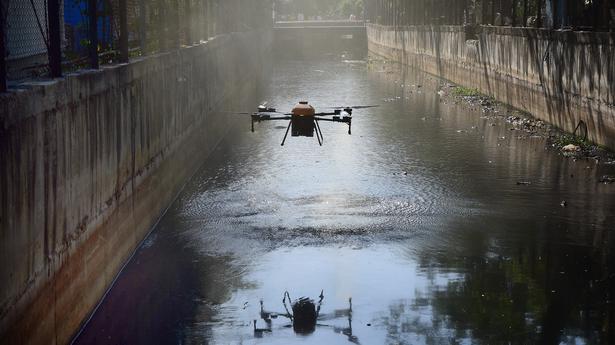
Massive drive against mosquito menace in city tomorrow
The Hindu
Corporation to deploy drones for 15 days to spray the lavicide on water channels
The Greater Chennai Corporation will launch a mosquito control drive in the wake of growing number of complaints from residents across the city. Stagnant water in macro canals had become mosquito breeding sources as water flow in the Cooum and the Adyar had reduced owing to sand bars. Following a request from the civic body, the Water Resources Department will resume work to remove sand bars.
With rain receding after Pongal and shutter gates of the major reservoirs closed, the flow in both the rivers had decreased to minimal of about 150 cusecs. Water Resources Department officials said work to remove sand bars in the river mouths was carried out till mid-January as part of monsoon preparedness project. This was to ensure free flow of floodwater during rain. However, the exercise was stopped in February.
It has been decided to engage machinery to clear sand bars in the estuaries during March and April following a request from the Corporation. This would ensure smooth tidal action and drain out water carried by the city’s macro drain and reduce mosquito breeding. The impact of the tidal action could be experienced up to a distance of 5-6 km in the rivers, the officials said. The department had diverted surplus water from the Poondi reservoir to the Cooum in November to fill the checkdams in the unpolluted stretch and flushout the urban stretch of the river.
Corporation Commissioner Gagandeep Singh Bedi said the mosquito control operation would be intensified next week. “We have ordered Tamil Nadu Drone Corporation to spray (larvicide) for 15 days over the water channels in inner areas of the Corporation. About 3,000 workers will go house to house from 7.30 a.m. to 10.30 a.m. for source reduction. In the next three hours, the workers should use local sprayers to eliminate local cesspools to eliminate mosquito larvae.”
“In addition, morning and evening fogging will be continued. We have said that fogging should be intensified and overseen by senior officers. Regional deputy commissioners should personally supervise fogging operations and source reduction,” said Mr. Bedi.











